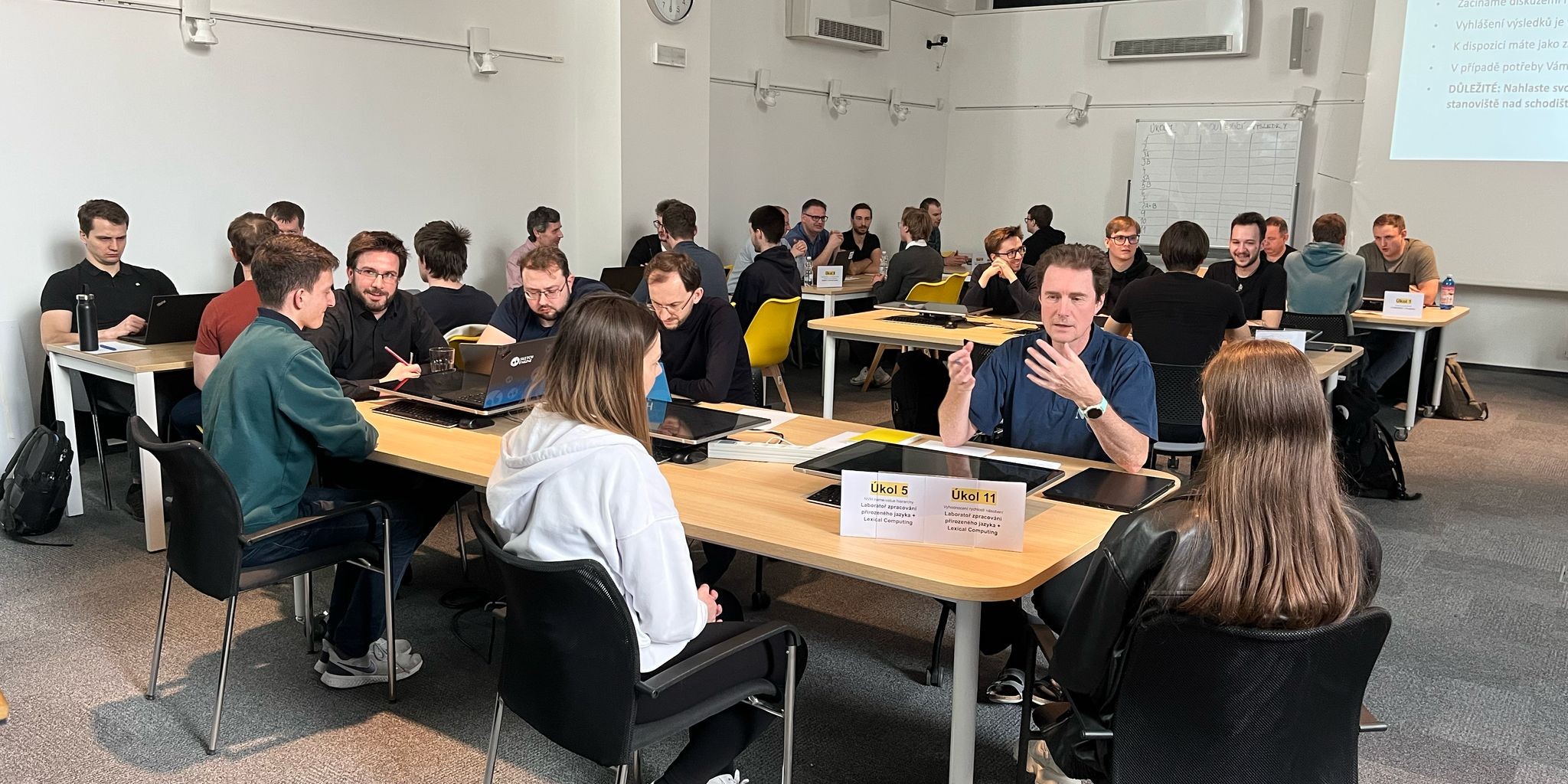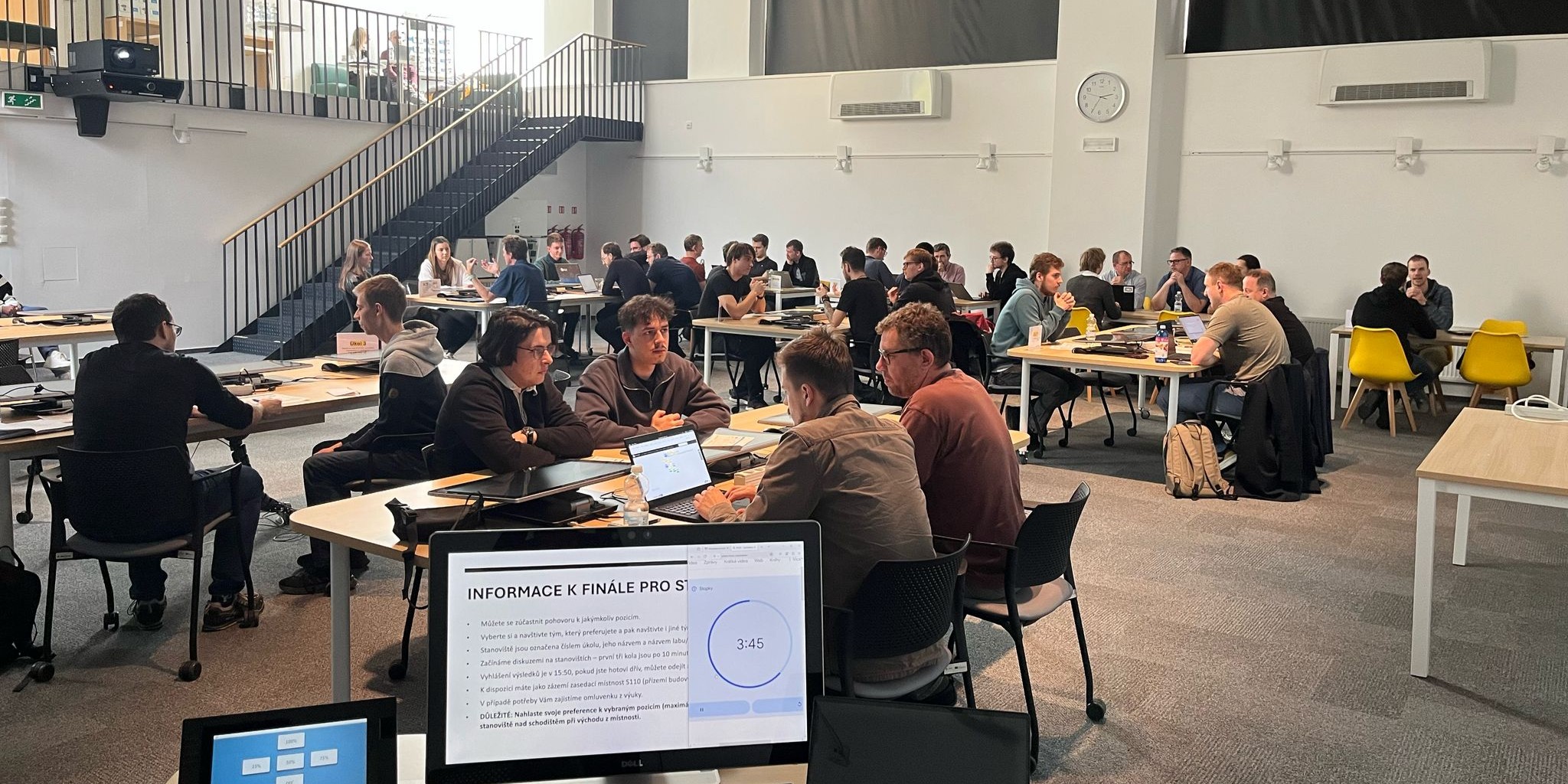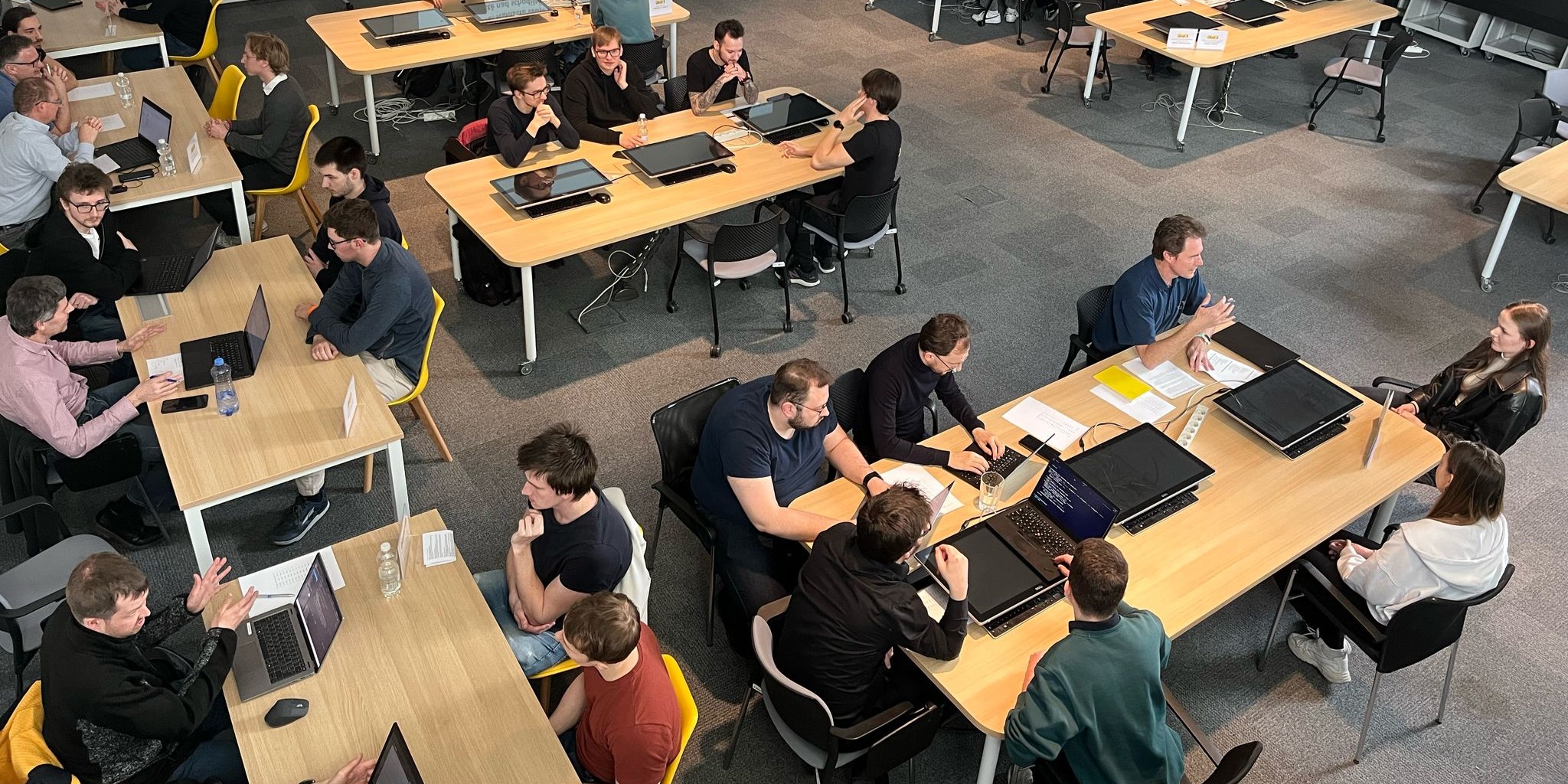Talent@FI
Join the competition for talented FI students
The Association of Industrial Partners of the Faculty of Informatics of Masaryk University (SPP FI MU) in cooperation with companies
Lexical Computing, Red Hat Czech, Honeywell, Monet+, Sewio and Novanta announces the
Talent@FI 2026 competition.
The competition is open to students in the 2nd and 4th semesters of Bachelor studies. The competition will include several tasks in computer science, which will take 24 hours to solve. The final part of the competition will take place in the form of interviews with representatives of FI laboratories and partner companies. The finalists can get one of the student researcher positions with a scholarship.
Stipends will range from 4-8k per month, depending on the intensity of involvement in the lab. For each position, a specific supervisor will be identified from the staff or PhD student's lab.
Competition process:
- Announcement of tasks - Monday, March 23, 2026 at 9:30
- Final interviews - Thursday, March 26, 2026 at 14:00
(details of the tasks and final interviews to be added)
Open positions in laboratories:
Sysadmin junior
Laboratory: Natural Language Processing Centre (NLP)Partner company: LEXICAL COMPUTING CZ s.r.o.
Number of open positions: 1
Expected start date: Starting from May 1, 2026, or by mutual agreement.
Job description:
- Administration of Linux servers.
- Administration of Linux Linux systems.
- Development of hardware infrastructure.
- Supporting other users.
Development of the Perun tool for performance analysis and testing
Laboratory: Laboratory of Analysis, Verification, Logic, and Automata (AVELAB)Partner company: Red Hat Czech, s.r.o.
Number of open positions: 1
Expected start date: By mutual agreement; expected start of the collaboration during the summer.
Job description:
- Development of the Perun tool used at Red Hat to analyze the performance of the Linux operating system kernel and/or user programs.
- Research of new advanced algorithms and data structures for (semi-)automatic detection of performance changes and their origin.
- Design and implementation of new interactive visualizations for faster manual analysis of the origin of performance errors.
- Development of new profiling tools and instrumentation for cloud-based tools and solutions.
- You don't need to be an advanced programmer or have extensive knowledge in performance analysis; an analytical mindset, an interest in C/C++/Python programming (preferred) and a desire to find innovative solutions to complex problems are key.
Development of tools and research in the area of analysis of specifications and models of aviation (or other safety-critical) systems
Laboratory: Laboratory of Analysis, Verification, Logic, and Automata (AVELAB)Partner company: Honeywell, spol. s r.o.
Number of open positions: 1
Expected start date: By mutual agreement.
Job description:
- Validate informal or semi-formal specifications of safety-critical systems, such as aerospace components or medical devices, using logical reasoning or other formal methods such as SMT solving.
- In addition to specification validation, one can also focus on specification formalisation, e.g. using LLM models and other modern approaches in the field of generative artificial intelligence.
- Analysis of models created using specialized avionics libraries for MATLAB/Simulink, such as the public libraries BLADE/BALROG developed in collaboration with the research groups AVELAB FI MU, VeriFIT FIT BUT and Honeywell. Current analyses focus on automatic test generation for certification purposes, which are highly demanding in terms of both requirements and code coverage, using SMT solvers such as Z3.
- Research and development of new algorithms for analysis, their implementation, experimentation with them, or also research in the design of safety critical systems themselves, so that they are as simply specified as possible and at the same time the best analyzable. Another interesting problem is the presentation of a comprehensible explanation of the result of the analyses in a form acceptable to the certification authority as evidence of compliance with the requirements imposed on the development of safety critical systems.
- It is not necessary to have a deep knowledge of safety-critical system analysis methods, their specifications or MATLAB/Simulink models. What is important is an interest in the field, including the mathematical roots of the methods used, and a desire to solve complex problems at the interface of formal methods and advanced algorithmization.
Processing and visualization of metadata from cryptographic devices
Laboratory: Centre for Research on Cryptography and Security (CRoCS)Partner company: MONET+, a.s.
Number of open positions: 1
Expected start date: Immediately or by mutual agreement.
Job description:
- Development and research in the field of processing and visualization of metadata obtained from cryptographic devices (https://github.com/crocs-muni/scrutiny-viz).
- The main goal of the collaboration will be to extend existing data analysis and visualization.
- Depending on the student's interests, the work can be more implementation or more analysis work.
- The work will be done in a team effort in collaboration with the company and other lab members.
- We expect an interest in applied security and knowledge of Python (no need to be an advanced programmer). We are interested in a longer-term collaboration that may naturally transition into a bachelor's thesis solution.
Extension of the MeeSign threshold cryptography demonstrator
Laboratory: Centre for Research on Cryptography and Security (CRoCS)Partner company: MONET+, a.s.
Number of open positions: 1
Expected start date: Immediately or by mutual agreement.
Job description:
- The main goal of the collaboration is to extend the integration of MeeSign into surrounding systems through appropriate interfaces (e.g. PKCS#11, FIDO2...), preparing demonstration scenarios and potentially adding additional threshold protocols to the platform at a later stage.
- The activity will be carried out in a team effort with other members of the lab.
- We expect an interest in applied security and basic programming experience (it is not necessary to be an advanced programmer in a specific language). Knowledge of Rust (for backend) or Flutter (for frontend) is a great advantage.
- We are interested in a longer-term collaboration that can naturally transition into a bachelor thesis solution.
Embedded Linux Developer
Laboratory: Design and Architecture of Digital Systems Laboratory (EmLab)Partner company: Sewio Networks s.r.o.
Number of open positions: 1
Expected start date: Q3 2026
Job description:
- System design of a suitable platform for battery units of a distributed UWB location network.
Research Assistant for Agentic AI
Laboratory: Design and Architecture of Digital Systems Laboratory (EmLab)Partner company: Novanta Česká republika s.r.o.
Number of open positions: 1
Expected start date: 1. 5. 2026
Job description:
- Deploy and operate AI models in Azure cloud platform .
- Systematic optimization of prompts and context for AI models.
- Design and implement agentic workflows.
- Focus on source code evaluation and review.
Basic information
- The competition takes place within the framework of the activities of the FI MU Industrial Partners Association (SPP FI MU).
- Finalists of the competition apply for scholarship-supported research assistant positions in FI laboratories.
- The scholarships are paid from the contracts of individual SPP members (companies).
- Team = SPP company representatives + FI laboratory representatives.
- Competitors are typically in their 2nd or 4th semester of undergraduate studies.
- For two months after the final competition, team representatives are prohibited from contacting students who have been selected for positions.
- Company logos on promotional materials are sorted by partnership level and then alphabetically (in accordance with SPP practice).
Competition schedule
Preparation (labs/companies)
1) Definition of positions (usually February).2) Specification of tasks (usually early March).
Competition progress (labs/companies + learners)
3) Announcement of tasks, their solutions and subsequent corrections (usually Monday to Wednesday in late March or early April).Final (labs/companies + selected learners)
4) Interviews for offered positions and their filling (usually Thursday of the same week as the announcement and corrections of assignments).
-
Definition of positions
Companies and FI labs (teams) agree on the job description of research assistants and determine the number of students being sought for each position.
Teams will enter the position definition into a shared document with the following breakdown:
- Position title (for example, research assistant in ...)
- Laboratory name
- Name of sponsoring company
- Number of learners to be recruited for the position
- Job description - max 5 bullets
- Tentative start date
Position to be created for a minimum of one semester (5 months). There is no upper limit and the possibility of continuing research activities in a laboratory or company is envisaged.
Stipend ranges from 4-8 thousand CZK per month depending on the intensity of involvement (approx. 1 day/week).
Advertising of positions with the logo and company name will be ordered by partnership level and then alphabetically (in line with SPP practice).
-
Specification of tasks and their announcement
Teams will enter task specifications into a shared document, each with the following:
- Task name
- Description of up to two A4 pages
- Submission details
All assignments will be published simultaneously on the competition website.
There will be 36 hours from the time of publication to solve the task or tasks.
Contestants may also submit a partial solution.
Solutions will be submitted to the submission room in IS MU.
Registration of students is not necessary in advance - it will be done automatically by submitting the solution in IS.
The competition organizer may adjust the difficulty of the tasks after agreement with the teams based on a comparison of all specifications.
The numbering of tasks will be done according to the time of their submission to the organizers.
-
Corrections to the tasks
Teams will supply the names and ID numbers of the correctors who will be given access to the submitted solutions.
The corrections should be made by Wednesday 15:00.
The correctors will provide the competition organisers with a list of names and PINs of learners to be invited to the finals.
The organisers will arrange to invite the finalists.
-
Finals
Interviews for the offered positions
Finalists can interview for any positions they are interested in - regardless of which task they have solved.
Labs and companies agree in advance on the composition of the team (usually 1-3 representatives) that will conduct the interviews.
Interviews are conducted in three consecutive sessions of 10 minutes each.
This is followed by 15 minutes of short follow-up interviews if there is more interest in a particular team.
Learners self-select the positions they are interested in and the teams they wish to interview with.
Learners should have an idea of the amount of time they can devote to working on the position.
After the interviews, learners will communicate the order of the positions they are interested in (in descending order of preference).
Teams will communicate the names of the learners they are interested in.
Positions filled
Positions are filled based on a match between the team's nominations and the learner's preferences.
The learner has priority in the selection process.
The learner may decline the offered position.
Learners who did not get any positions in the final round can approach any team - and teams can approach them as well. Such collaborations are arranged individually according to the capabilities of the lab and the company.
The teams will discuss with the selected learners the start of the collaboration, its preliminary duration, the scope of the involvement and the amount of the stipend.
A version of the rules is also available as a PDF file.
Important info for Talent@FI researchers
Schedule
The competition takes place over one week in March/April:
- Challenges are announced and posted on the SPP website under the "Current Year" tab - usually on Mondays.
- The final round of the competition takes the form of interviews with the successful solvers - usually on Thursday.
Basic information
- The competition is for 2nd and 4th semester undergraduate students.
- There is no need to register in advance - registration is done automatically by submitting the solution in IS.
- Participation is free of charge.
- Finalists may be eligible for scholarship-supported research assistant/assistant positions in FI MU laboratories based on interviews.
- Tasks will be posted in IS on the day of the competition and can be accessed by clicking through from the SPP website.
- You will submit your solutions to the assignments to the submission room in IS - the link is included in the posted assignments.
- You can also solve several different tasks.
- The problem solution does not have to be complete - you can submit an incomplete problem as long as it describes the idea of the solution.
- Teams will be open for a designated time during the competition for any questions.
- Solvers whose results are judged satisfactory by the sponsor are invited to the final round of the competition.
- Expect that even if you make it to the finals, the team may not select you for a lab position.
- It is a good idea to have a realistic idea of your time availability for possible involvement in the lab.
The course of the finals
- The finals take the form of an interview/selection process involving company and lab representatives (teams of 1-3 representatives).
- All the teams are together in one meeting room and each team has a seat marked with the position title.
- Choose the positions you are interested in and visit their team. It is helpful to know the name of the position or lab you are applying to.
- You can attend interviews for any positions you are interested in, regardless of the task you are doing.
- The interview for each team is a maximum of 10 minutes.
- You can interview with multiple teams in sequence.
- The entire final interview lasts approximately two hours (approximately 14:00-16:00).
- The position depends on whether your choice and the team's choice meet. If your preferences don't meet, you can arrange to work with one of the teams individually, and the team can ask you to work with them as well.
2025
- Lexical Computing, Red Hat Czech, Honeywell, Monet+, Progress, and Y Soft participated in the 14th edition of the competition.
- 12 students were awarded a position in FI laboratories.
2024
- Lexical Computing, Red Hat Czech, Monet+, Y Soft and Progress participated in the 13th edition of the competition.
- 6 students were awarded a position in FI laboratories.
2023
- Konica Minolta, Lexical Computing, Red Hat Czech, AHEAD iTEC, Y Soft, NXP Semiconductors, Progress and Umíme to participated in the 12th edition of the competition.
- 10 students were awarded a position in FI laboratories.
2022
- Lexical Computing, Red Hat Czech, AHEAD iTEC, Y Soft, NXP Semiconductors and Umíme to participated in the 11th edition of the competition.
- 8 learners were awarded a position in FI laboratories.
2021
- Lexical Computing, Red Hat Czech, AHEAD iTEC, Honeywell, Y Soft and Flowmon Networks participated in the 10th edition of the competition.
- 7 students were awarded a position in FI laboratories.
2020
- Lexical Computing, Red Hat Czech, AHEAD iTEC, Y Soft and Flowmon Networks participated in the 9th edition of the competition.
- 12 students were awarded a position in FI laboratories.


